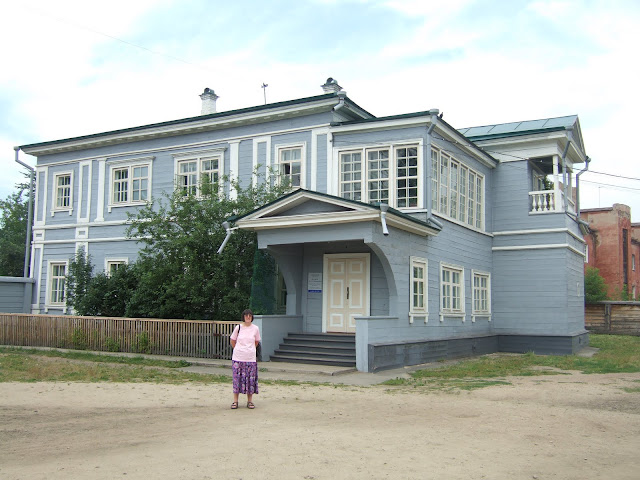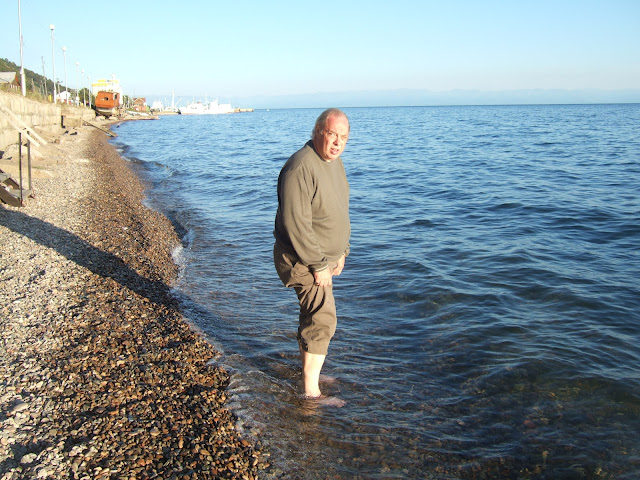 |
| Russia |
 |
| Irkutsk |
Irkutsk: First Impressions
At first glance Irkutsk seems a down-at-heel sort of city.
The minibus dropped us outside the Hotel Angara, where we would deposit our luggage for the day. Inside the upmarket hotel, which was considerably less down-at-heel, we spotted a post office and decided to send the cards we had bought at Yekaterinburg. The cards were enormous, but in no way big enough for the huge stamps, four of which were required for each. For some reason this irritated the woman behind the desk, and she was further incensed to find that we intended to purchase her whole stock – leaving two postcards still unstamped. We were treated to a Russian speciality: public service with a tantrum.
 |
| Irkutsk |
A young man of vaguely Middle Eastern appearance was waiting behind us. ‘Where do you come from?’ he asked pleasantly. ‘From England’ we replied. He pursed his lips and shook his head. ‘Isn’t it a bit rough there, now?’ Slightly perplexed by this response, we assured him there was no better place on earth, except possibly Irkutsk and wherever he came from, and set out to explore the city.
At second glance Irkutsk seems a down-at-heel sort of city.
 |
| Irkutsk is in southern Siberia at the southern tip of Lake Baikal |
Kirov Square and the Cathedral of the Epiphany
The Hotel is beside Kirov Square, which once sported two cathedrals and two other major churches. This was considered a superabundance for a city of only half a million people, so when the Cathedral of Our Lady of Kazan was destroyed in the civil war that followed the revolution, the Central Government Headquarters was built on the site. It is a truly ugly building. Opposite, the World War II memorial is in a sad state of neglect. The substantial Church of Our Saviour is now a museum, whilst the Polish Catholic Church, built in 1882 and Siberia’s only neo-Gothic church has become neglected as the Polish population has drifted away.
Only the Cathedral of the Epiphany remains in good condition having been re-consecrated after serving as a museum in the Soviet era. An unusually low building for a cathedral with a detached bell tower, its exterior had been freshly painted in the Russian ‘cake-decoration style’. The interior is covered with painting of saints, heaven and hell, angels, archangels and Virgins with and without Child. We watched two artists on scaffolding adding colour and calligraphy to new frescos.
 |
| The Cathedral of the Epiphany, Irkutsk |
A small group of beggars had gathered by the door to receive our largesse. None of them were young, and it is easy to see why some people still think fondly of the Soviet era, when the young had jobs they were paid for, and the old could live on their pensions. They may not have had riches or political freedom, but they did not have poverty either.
We walked towards the commercial centre, stopping at a Post Office to dispatch the last of our cards. Here we encountered the other version of Russian public service, the one where you become invisible as you approach the counter. Fond thoughts of Soviet egalitarianism evaporated quickly.
Lenin Street and Karl Marx Street
After eventual success, we made our way down Lenin Street to the main drag, predictably called Karl Marx Street.
On our way we passed a number of the wooden building that are - or should be – Irkutsk’s pride and joy. With their carved ‘Siberian Lace’ decoration, their existence within an urban setting is almost unique. Sadly, those that are not falling down have been demolished to make way for cheaply constructed, badly designed modern buildings. Irkustsk will not be the first city to realise what treasures it had only after the last of them has gone.
 |
| Wooden Houses, Irkutsk |
The main street was built in more confident times, when the city was still a boom town. Irkutsk was founded in1652 as a military outpost and by the 19th century was the administrative capital of Siberia. It still feels like a frontier town, a little like some small towns in the American west that once hoped to grow into Los Angeles or Seattle but never did. Just as the Americans pushed west in the nineteenth century to open up their continent, the Russians pushed east to open theirs – though without the cowboy hats and the movies. The city was a place of exile – most notably for aristocrats involved in the failed ‘Decembrist’ coup of 1825 – but most newcomers arrived of their own free will, particularly when gold was found in the area.
 |
| Karl Marx Street, Central Irkutsk |
Though different in type, the difficulties of reaching Irkutsk in the 19th century were of the same scale as travelling the Oregon Trail. This changed when the railway arrived in 1898. Bradshaw’s ‘Through Routes to the Capitals of the World’ said of Irkutsk in 1903 ‘The streets are not paved or lighted; the sidewalks are merely boards on cross pieces over the open sewers…the police are few, escaped criminals are many….the stranger should not walk after dark; if a carriage cannot be got…the only way is to walk noisily along the planked walks….to walk in the middle of the road is to court attack from the garrotters with which Siberian towns abound’.
At third glance, Irkutsk seems a down-at-heel sort of city, but it has improved dramatically in the last 100 years.
An Italian Restaurant in Karl Marx Street
Café Snezhinka, inside one of the buildings on Karl Marx Street, has a high stucco-ed ceiling and a pleasant old world feel. We both read Cyrillic, but like primary school children, spelling each word out letter by letter and often arriving at nothing we can understand. On this occasion, we quickly deciphered Карбонара (carbonara) followed by Спагети (spaghetti) - it did not require a genius to deduce we were in an Italian restaurant, of sorts. The Siberian versions of carbonara and spaghetti bolognese had a weightiness that would have astounded their Italian originators, but were nonetheless pleasant enough.
The Trubetskoy and Volkonskaya Houses
The Decembrist rising of 1825 was an attempt to replace the autocratic rule of the Tsar with a constitutional monarchy. Five of the leaders were hanged in St Petersburg, the soldiers involved were transported to Siberia in chains, but the aristocratics involved merely found themselves sentenced to exile.
 |
| The Trubetskoy House, Irkutsk |
We walked the best part of a kilometre down Karl Marx Street to see the house where Prince Trubetskoy and his wife endured their exile. It was covered in scaffolding and closed, so we walked on to the home of Maria Volkonskaya, wife of another Decembrist. It is a large and comfortable house still containing Maria’s furniture, clothes and letters. It is not altogether surprising that some of the Decembrists chose to stay in Irkutsk when their exile finished rather than return to the intrigues of St Petersburg.
 |
| The house of Maria Volkonskaya, Irkutsk |
Others live less comfortable lives today. Walking back into town we saw people filling buckets with water from hand pumps in the street.
Loose Change
We dropped into a supermarket to buy supplies for our night on the train. Prices, as always, were quoted to the kopeck. This was sensible in the days when there was approximate parity between the rouble and the pound. The rouble crashed along with the Soviet Union and the new rouble - a thousand of the old soviet roubles – is worth 2 pence. In the days of the Italian Lira prices were often given to the precise Lira, but the cashier always rounded off to the nearest hundred when giving change, not so in Russia; you get your exact change down to the last kopeck. The tiny 1 kopeck coin is of such infinitesimally small value it costs more to hand over than it is worth. Unsurprisingly the recipients do not value them greatly and abundant if worthless loose change can be gathered in any Russian street just by bothering to bend down.
Off to Ulan Ude
We returned to the Hotel Angara to meet a man called Alexander who would give us our onwards tickets and drive us to the station. He was waiting not with two tickets but with four. ‘You can have the whole compartment to yourselves’ he said, ‘it will be more comfortable.’
This arrangement seemed simple enough, but was beyond the comprehension of the provadnitsa who looked at our four tickets, then the two of us and shook her head. ‘Where are the other two?’ she probably asked, though we did not understand. ‘Just us two,’ we answered, equally incomprehensibly. As we settled in she searched up and down the carriage for the other two people. As the train pulled out she shrugged her shoulders, gave us four sets of bedding and washed her hands of the affair.
Our next stop, Ulan Ude, was only 400 km away, but the journey took all night. The trip round the southern tip of Lake Baikal is allegedly the most scenic section of the whole journey, but it was dark, so I cannot comment.
Rudolf Nureyev was born on the 17th of March 1938 in a Trans-Siberian sleeping compartment travelling between Irkutsk and Ulan Ude. We had a much less eventful journey than Mrs Nureyeva.


















